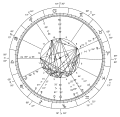This is an old revision of this page, as edited by Zachariel (talk | contribs) at 23:02, 1 July 2012 (Adding content). The present address (URL) is a permanent link to this revision, which may differ significantly from the current revision.
Revision as of 23:02, 1 July 2012 by Zachariel (talk | contribs) (Adding content)(diff) ← Previous revision | Latest revision (diff) | Newer revision → (diff)
Mundane astrology is the astrological study of heavenly cycles upon groups and nations, world affairs and world events. The name derives name from the Latin term mundus, 'world'.
Mundane astrology is widely believed by astrological historians to be the most ancient branch of astrology. Astrological practices of divination and planetary interpretation have been used for millennia to answer political questions, but only with the gradual emergence of horoscopic astrology, from the sixth century BC, did astrology develop into the two distinct branches of mundane astrology and natal astrology.
Astrologically, the affairs of a nation are judged from the horoscope set up at the time of its official inauguration or the birth chart of its leader, or various phenomena such as eclipses, lunations, great conjunctions, planetary stations, comets and ingresses.
The techiques of the subject were discussed in detail in the 2nd century work of the Alexandrian astronomer Ptolemy, who outlined its principles in the second book of his Tetrabiblos. Ptolemy set this topic before his discussion of individual birth charts because he argued that the astrological assessment of any 'particular' individual must rest upon prior knowledge of the 'general' temperament of their ethnic type; and that the circumstances of individual lives are subsumed, to some extent, within the fate of their community. The third chapter of his work offers an association between planets, zodiac signs and the national characteristics of 73 nations. It concludes with three assertions which act as core principles of mundane astrology:
- Each of the fixed stars has familiarity with the countries attributed to the sign of its ecliptic rising.
- The time of the first founding of a city (or nation) can be used in a similar way to an individual horoscope, to astrologically establish the characteristics and experiences of that city. The most significant considerations are the regions of the zodiac which mark the place of the Sun and Moon, and the four angles of the chart – in particular the ascendant.
- If the time of the foundation of the city or nation is not known, a similar use can be made of the horoscope of whoever holds office or is king at the time, with particular attention given to the midheaven of that chart.
References
- Michael Baigent (1994). From the Omens of Babylon: Astrology and Ancient Mesopotamia. Arkana.
- Michael Baigent, Nicholas Campion and Charles Harvey (1984). Mundane astrology. Thorsons.
- Steven Vanden Broecke (2003). The limits of influence: Pico, Louvain, and the crisis of Renaissance astrology. BRILL. pp. 185–. ISBN 978-90-04-13169-9. Retrieved 5 April 2012.
- Raphael, (1931) Mundane Astrology, pp.15-17. Fowlsham & Co.
- Ptolemy, Tetrabiblos II,1 (Loeb: p.119): "And since weaker natures always yield to the stronger, and the particular always falls under the general, it would by all means be necessary for those who purpose an inquiry about a single individual long before to have comprehended the more general considerations".
- Ptolemy, Tetrabiblos II.3 (Loeb: pp.157–161).
External links
- 17th Century study in the Ancient Art of Mundane Astrology hosted by Skyscript (accessed 1 July 2012). The complete fourth book of William Ramesey's Astrologiae Restaurata, 'Astrology Restored' (London, 1653), edited and annotated by Steven Birchfield (1.43MB). The Fourth book is entitled Astrologia Munda, 'Mundane Astrology' - said by Birchfield to be the closest thing we have to an accessible textbook on traditional mundane astrology.
- Second book of Ptolemy's Tetrabiblos hosted by | Bill Thayer's LacusCurtius (accessed 1 July 2012). Most detailed source of ancient mundane astrology principles.
